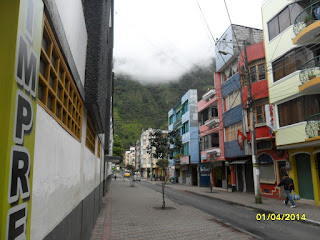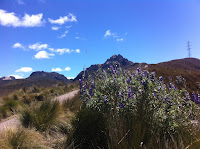Enjoy some Ecuatoriano goodness.
- Cacho = “lie,” or “fib.” It is used in the sense of being sarcastic
and then saying “oh just kidding!” So normally it’s used as a very
light-hearted, funny way of exaggerating.
- Chévere/cheverengue = Both of these terms means “cool,” “awesome,”
“tight,” or any other English equivalent for stating your approval,
admiration, or relaxed/fun demeanor. Everybody uses it.
- Bacán= essentially the exact same as Chévere, but used only between
friends. It is also viewed more as a “hippy” word.
- Pelucones = slang for a rich person. Usually implies that they are
snobby, or puffed up. Someone with a lot of money. If you pass by a rich
neighborhood, you would say that a “bunch of pelucones” live there.
- Shuta / Chuta / Chute = curse word. Used as a substitute for a much
stronger curse word.
- Achachay = word in Kichwa that means “cold,” but is used by
everybody in Ecuador. If you’re cold, you say “Achachay!”
- Arrarray = same as achachay, except ‘hot’ instead of ‘cold.’
- La hora pico = rush hour. In the city, usually
between 4pm and 7:30pm.
- Katzo = another word for a type of beetle in Ecuador. Another
Spanish word would be “escarabajo.” They are seasonal, and at certain
times of the year they come out in droves. They can be
cooked and eaten as well.
- Caretucos = someone without shame. It’s used in a derogatory sense,
denoting a prideful person or someone who is full of themselves.
- Atracos = robbery. In Ecuador, if you get robbed or assaulted in
any way, you were the victim of an “atraco.”
- Yucca = a very offensive term used only to denote disdain or
disrespect. The equivalent of flipping someone off with your middle
finger. A young protestor shouted this at Ecuador’s president and he had
him arrested. Yucca is also a vegetable.
- Borrego = has two meanings: the more common term is drunk. If
you’re ‘borrego,’ you’re drunk. The second meaning is what you call
someone who agrees with everyone else without thinking. While writing
this, there is a lot of civil unrest with people getting mad at the
president. Citizens claim that the president’s cabinet is full of a bunch
of borregos; that’s to say his cabinet is full of a bunch of people who do
nothing but agree with him, no matter what.
- Churros / zambos = this is what they call curls in your hair. My
companion got a haircut, and a friend of ours exclaimed “Ay! Te quitaron tus churros!”
- Achicharrar = to burn. This term is used only for people. In other
words, if someone gets burned alive or burnt at the stake (which actually
still happens) they use achicharrar. But if you burn a piece of wood or
something else, it doesn’t apply.
- Vago = lazy. Derived from the word “vagabundo,” Ecuadorians use
this simpler term to denote someone as lazy or aimless.
- Media naranja = refers to a girlfriend/boyfriend or husband/wife.
Similar to when couples refer to their spouse as “my other half” or “my
better half.” It’s a nickname
that shows affection.
- Costilla = wife. Costilla means rib. In Ecuador, this also refers
to the scripture in genesis where God made woman out of Adam’s rib. So
when you find your ‘rib,’ you find your wife.
- Aventon = ride. As in, if you ask someone if they can give you a
ride somewhere, you ask them for an “aventon.” Not a very common term, but used nonetheless.
- Tuco = strong. This is pretty interchangeable with “fuerte.” Used amongst friends mostly.
- Ñaño = brother or sister or close friend. This is an interesting
one as it isn’t used very frequently. It denotes friendly endearment and
closeness. If you aren’t really close with someone (emotionally) then you
wouldn’t use this word. Mostly used between siblings, but can also be used
between very close friends.
- Amigovios = friends with benefits. I won’t go too much into detail
here.
- Vacile = this is the same as amigovios really, but connotes more of
a one night stand.
- Campana = spy guard, dirty guard, informant. Many neighborhoods
have some sort of security guarding the entrances, and if a guard accepts
payment to reveal critical information about the people he guards, Ecuadorians
refer to him as a “campana,” or “a bell.”
- Chapa = policeman. This is the english equivelant of calling a
policeman a ‘cop.’
- Chapa acostada = speed bump. Literally translated, this would be
‘lying down cop,’ and refers to the idea that speed bumps enforce your
speed, just like a normal cop.
- Gua gua = baby. This is another word in Kichwa, the native language
of Ecuador. Most Ecuadorians know this term and use it frequently.
- Pelado / Peladito = kid, youth. Literally, ‘pelado’ means peeled or
bald, but Ecuadorians use it as calling someone a kid.
- Farriar = to party. Virtually identical as ‘fejestar,’ but this is used
much more commonly.
- Zuko = blonde.
















































